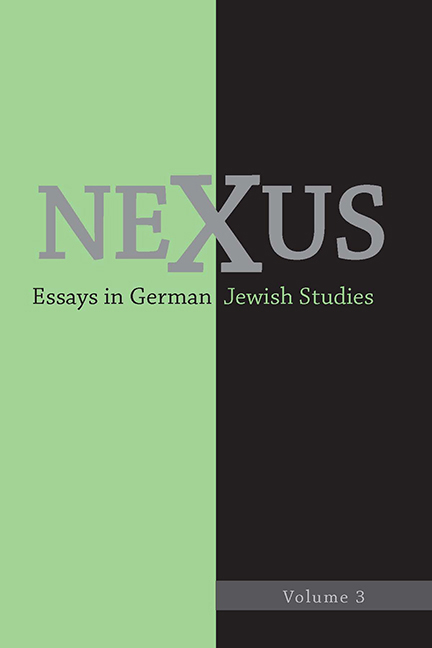Book contents
- Frontmatter
- Dedication
- Contents
- Acknowledgements
- Introduction
- “Ein weites Feld”: Ein Wort zu deutsch-jüdischen Studien anläβlich der Verleihung des ersten Egon Schwarz Prize for the Best Essay in German Jewish Studies
- “An Open Field”: A Word about German Jewish Studies on the Occasion of the Presentation of the first Egon Schwarz Prize for the Best Essay in German Jewish Studies
- Laudatio for Abigail Gillman's Prize-Winning Nexus Essay: “Martin Buber's Message to Postwar Germany”
- Heinrich Heine in Modern German History, by an Eyewitness
- Jeffrey Sammons, Heine, and Me: Some Autobiographical Reflections
- Heine's Disparate Legacies: A Response to Jeffrey Sammons
- My Debt to Heine and Sammons
- Die letzten Tage der Menschheit as a German-Jewish Tragicomedy, and the Challenge to Translators
- Edward Timms's “Die letzten Tage der Menschheit as a German-Jewish Tragicomedy and the Challenge to Translators”: A Response
- Kraus the Mouse? Kafka's Late Reading of Die Fackel and the Vagaries of Literary History
- The Parable of the Rings: Sigmund Freud Reads Lessing
- The Poetics of the Polis: Remarks on the Latency of the Literary in Hannah Arendt's Concept of Public Space
- The Marrano in Modernity: The Case of Karl Gutzkow
- German Jews Dogged by Destiny: Werewolves and Other Were-Canids in the Works of Heinrich Heine and Curt Siodmak
- Authenticity, Distance, and the East German Volksstück: Yiddish in Thomas Christoph Harlan's Ich Selbst und Kein Engel
Heine's Disparate Legacies: A Response to Jeffrey Sammons
Published online by Cambridge University Press: 11 May 2017
- Frontmatter
- Dedication
- Contents
- Acknowledgements
- Introduction
- “Ein weites Feld”: Ein Wort zu deutsch-jüdischen Studien anläβlich der Verleihung des ersten Egon Schwarz Prize for the Best Essay in German Jewish Studies
- “An Open Field”: A Word about German Jewish Studies on the Occasion of the Presentation of the first Egon Schwarz Prize for the Best Essay in German Jewish Studies
- Laudatio for Abigail Gillman's Prize-Winning Nexus Essay: “Martin Buber's Message to Postwar Germany”
- Heinrich Heine in Modern German History, by an Eyewitness
- Jeffrey Sammons, Heine, and Me: Some Autobiographical Reflections
- Heine's Disparate Legacies: A Response to Jeffrey Sammons
- My Debt to Heine and Sammons
- Die letzten Tage der Menschheit as a German-Jewish Tragicomedy, and the Challenge to Translators
- Edward Timms's “Die letzten Tage der Menschheit as a German-Jewish Tragicomedy and the Challenge to Translators”: A Response
- Kraus the Mouse? Kafka's Late Reading of Die Fackel and the Vagaries of Literary History
- The Parable of the Rings: Sigmund Freud Reads Lessing
- The Poetics of the Polis: Remarks on the Latency of the Literary in Hannah Arendt's Concept of Public Space
- The Marrano in Modernity: The Case of Karl Gutzkow
- German Jews Dogged by Destiny: Werewolves and Other Were-Canids in the Works of Heinrich Heine and Curt Siodmak
- Authenticity, Distance, and the East German Volksstück: Yiddish in Thomas Christoph Harlan's Ich Selbst und Kein Engel
Summary
IF ONE WORKS ON HEINE, one can scarcely get around the work of Jeffrey Sammons. By that I mean not only his groundbreaking study Heine, the Elusive Poet, but much that he has written in the years since. If Sammons has not addressed every single issue in Heine studies, he has undoubtedly read everything relevant to it. Moreover, lest one think this claim relevant only for the English-speaking world, one need only consult the important three-volume documentation of Heine's posthumous reception Heine und die Nachwelt (Heine and Posterity). Apart from its four hundred documents covering, in abridged form, circa 1800 pages, and its far more extensive bibliography, Heine und die Nachwelt contains three separate introductions totaling over 450 pages of text and notes. The index to this work, spread over three volumes, lists twenty-two references to Jeffrey Sammons, a number comparable to only one other North American scholar, Jost Hermand, who however hails from Germany and publishes mostly in German. Yet, the number of references alone, or the fact that Sammons is one of a half dozen North Americans listed from the last half-century and one of only a handful (besides Ruth Klüger, Peter Uwe Hohendahl, Paul Peters, and Jost Hermand) to have a contribution included in the anthology, reveals less than the fact that the author-editors cite Sammons's views early in the preface, relying on him there and elsewhere to help frame and develop their overall project (HNW 1:6). There can be no doubt that Sammons is a “Heine insider.”
These considerations help to contextualize Sammons's self-deprecating remarks toward his conclusion: “I began to wonder whether as a foreigner I was an intruder in the discourse, whether my fussy complaints about the accuracy of interpretation and research, disputing the claims that Heine was an ironist who meant the opposite of what he said, grouching about the reshaping of him to suit our own values and convictions, have been relevant or appropriate.” His prominence alone within Heine und die Nachwelt should lay permanently to rest any such concerns.
- Type
- Chapter
- Information
- Nexus 3Essays in German Jewish Studies, pp. 41 - 48Publisher: Boydell & BrewerPrint publication year: 2017



